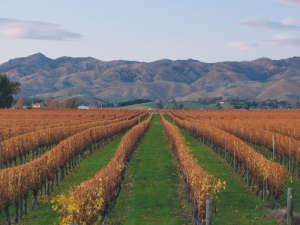There were some who scoffed at that figure – where on earth were 7000 hectares of land available in Marlborough for that level of growth?
Well for those who didn’t believe the figures, think again. Wine Marlborough’s General Manager Marcus Pickens says the predicted growth is already above target, with as many as 4400 hectares having been planted since the survey in 2016.
And with that growth has come the predicted problems that were also outlined – namely the requirement for more labour.
At the time of the survey the annual vineyard workforce in Marlborough stood at 8,325, with 2500 of those coming from RSE. To cope with increased production by 2020 the workforce would need to grow to 10,304 and RSE numbers would need to grow by 900. While the growth in vineyard plantings has grown quicker than anticipated, the workforce numbers have not and now there are very real concerns that vines will not be pruned this season because of that.
“Pruning has started earlier than ever before,” Pickens says, “and it is likely it will continue far later than ever before. That raises the issue of immense potential damage to vineyards.”
Despite caps being lifted on RSE numbers throughout New Zealand, Pickens says Marlborough has not seen a massive increase.
“The cap last year across the entire horticultural and viticulture sectors for RSE was 10,500 (workers) per annum. The new government increased that by 600 to 11,100. Of that 600 extra workers, Marlborough only received 80 despite requesting 250.
“We thought we demonstrated everything required to show that Marlborough needed a big increase in RSE workers, yet we got the smallest allocation of all the three main RSE regions.”
Pickens who is also the Chair of the Marlborough Labour Governance Group says the RSE unit has decided to undertake an operational review, they want to hear about the challenges employers and users of RSE face in the application and allocation process and they will try and resolve those in the future. The government has also signed off a policy review of RSE, the first undertaken since the scheme was introduced nearly 11 years ago.
“That is encouraging,” Pickens says. “I think it is very positive the unit is listening and trying to make the system better for all involved”.
But it doesn’t solve the problems the industry is facing currently. Time constraints and a lack of skilled workers could lead to a number of negative scenarios, Pickens believes. One being “cowboy” practices, where some contractors cut corners both in the field and with workers, increased likelihood of injuries due to workers having to work harder and faster, and the risk of vines being pruned inadequately, or not at all.
The issue of not having enough skilled workers to complete the winter pruning is not a new one in Marlborough. It has been an on-going concern in the region since the late 90’s. And with one of the lowest unemployment stats in the country, there is little chance that the increased need for workers can be found within the region.
“We need RSE, we cannot survive without it. We are where we are today because of RSE and we’ve employed more Kiwi’s because of it too. There is no way Marlborough’s vineyard area would have grown to this level without it. But we now need even more workers to cope with the ongoing growth.”
The perils of early and late pruning
In a perfect world, pruning in Marlborough would begin in July and be all wrapped up by the end of August, according to viticultural consultant Dominic Pecchenino. But that’s a perfect world, and currently Marlborough is anything but. “You can never do that,” he says. “
“We are forced to extend our pruning season on both sides of the bell curb. We have to start early and finish late because of a lack of workers.”
And that has consequences. The perils of pruning early are twofold. One, you open your vines up to disease via pruning wounds, because they don’t heal as fast as they do late in the season.
“The earlier you prune the longer your vine is susceptible to getting the likes of Eutypa and Botryosphaeria. That is a real issue.”
Number two; if you prune too early you run the risk of weakening your vine for the following season.
“You are not allowing your plant to collect all the nutrients that are still in the leaf that would naturally fall back into the plant as it goes into natural dormancy.”
Pecchenino says ideally it is best to wait until the frosts begin to kill off the leaves and any immature wood – but a lack of workforce means many people can’t wait for those climatic events to occur before they begin pruning.
In terms of late pruning, Pecchenino says there is a real risk of damaging swelling buds.
“In some situations, late pruning may not be a bad idea if you are in a real frost prone area – it can help delay your bud burst a little bit. But you also run the risk if you are wrapping canes and stripping out, of damaging buds, which will reduce your fruitfulness. You may have had 12 or 14 buds but wrapping late may have damaged five or six of those.”
Pecchenino agrees that Marlborough growers are having to prune earlier and last year he said there were still vines being wrapped at the end of September. “And that’s getting very late.”










